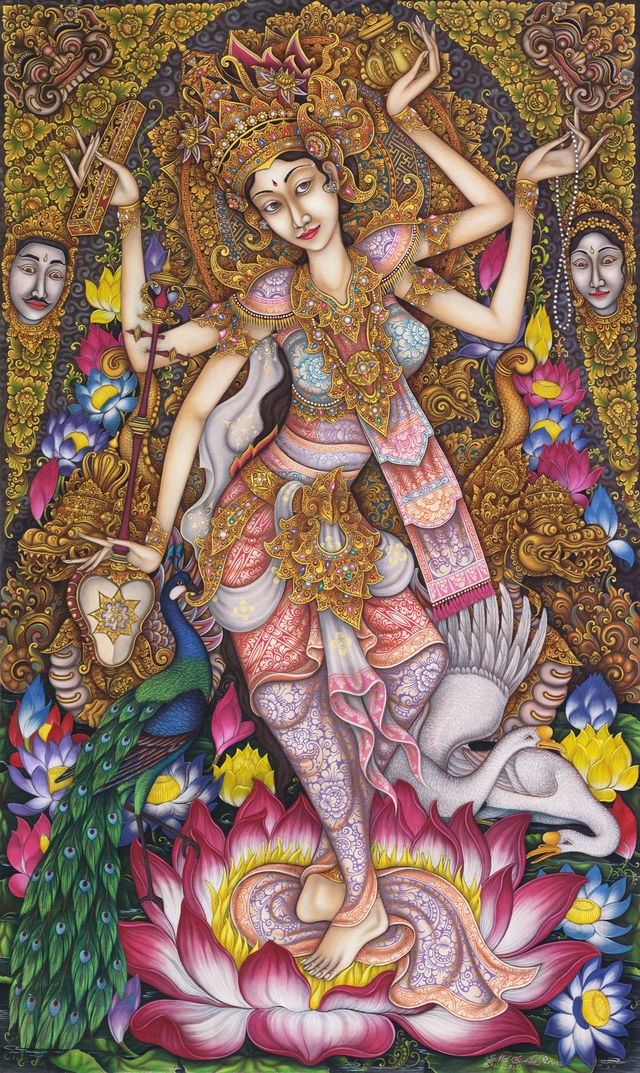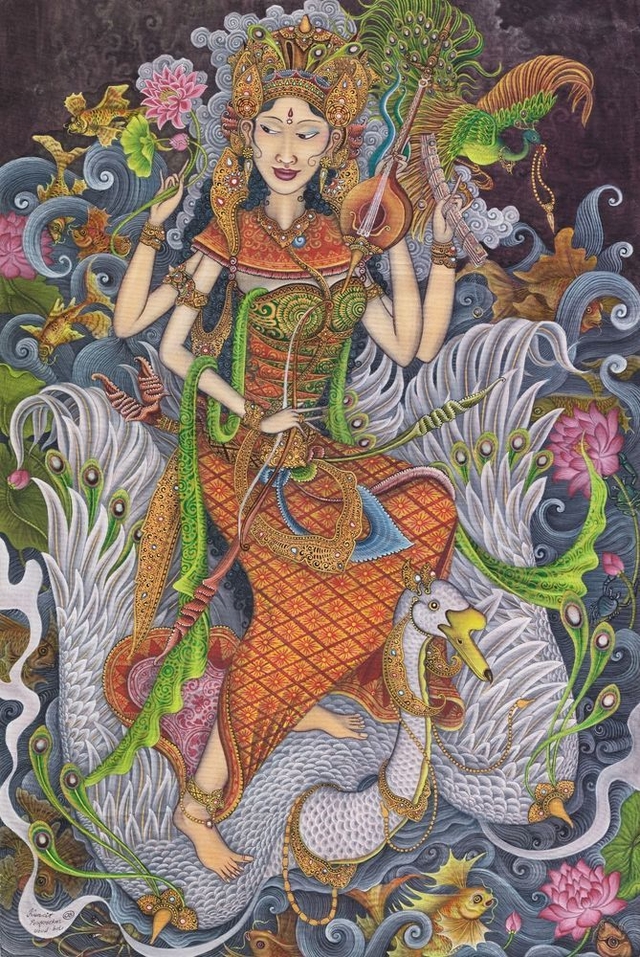
Happy Knowledge Day, friends! We haven't made a mistake. But this is the Balinese Day of Knowledge, dedicated to the goddess Saraswati. It is celebrated according to the Balinese Pawukon calendar every 210 days. It is called Hari Raya Saraswati or "Saraswati's festival," "great day of Saraswati" in literal translation.
Due to the 210-day cycle, Saraswati Day always falls on a Saturday.
Saraswati Day bears the name of the Hindu goddess of knowledge, music, arts, wisdom, and education. In India, the festival of this goddess is known as Vasant Panchami and is celebrated in the spring.
The Vedas tell that Saraswati was born from the mouth of Brahma, the "secondary" creator of the universe. Her beauty and purity captivated Brahma, and he desired to marry her. This action led to a curse upon Brahma, and thus worship rituals for him are conducted rarely.
One version suggests that the goddess's name comes from the two words "sara" and "swaandthi," which together express both knowledge and the holder of knowledge. Another explanation traces it back to the words "saras," which means "flow, stream," and "wati," which means "woman." This combination gives rise to a beautiful symbol of the flow of a river and knowledge.

According to believers' beliefs, Saraswati is not only a symbol of knowledge but also controls thoughts and words. She is described as a beautiful woman with 4 hands, holding books, a 108-bead rosary, and playing the sitar. The books often depicted are lontar - traditional manuscripts made on dried palm leaves.
The sitar symbolizes art, the books represent knowledge leading to enlightenment, and the rosary is a symbol of spirituality and dedication, as well as the continuity of knowledge and the cycle of life.
In paintings and sculptures, Saraswati is often shown standing on a lotus leaf with a swan and a peacock. They hold multiple meanings and interpretations for believers. The lotus is often said to signify purity, the idea that knowledge can be acquired in any situation or source of material creation, emerging from the spiritual world. The swan represents discernment and knowledge, capable of distinguishing between primary and secondary tendencies. The peacock symbolizes our restless mind.

The day before Saraswati is called "Pangredanan." On this day, books and manuscripts are gathered and cleaned from dust.
On Saraswati Day, Balinese people make offerings in temples and homes, seeking blessings for sacred texts, books, and sources of knowledge. Balinese students dress in festive attire and gather for celebratory events and prayers for successful studies.
Throughout the day of this holiday, there is a rule not to read books, only to make offerings to them and sanctify them. However, in the evening of the same day, it is a tradition for Balinese people to read sacred books in their homes and temples.
On the following day, "Banyu Pinaruh," which falls on a Sunday, Balinese people go to the ocean and perform a ceremony of purification and expression of gratitude to the supreme deity. "Banyu" translates to "water," and "pinaruh" means "wisdom."
Two days after Saraswati, on Monday, the Balinese observe Soma Ribek, where "soma" means "Monday" and "ribek" means "full." The Balinese make offerings, express gratitude to the gods for food and drinks, and pray to the goddess of prosperity, Devi Sri. This celebration serves as a reminder of the value of food and drink in human life.
Three days after Saraswati, on Tuesday, comes Sabuh Mas. "Sabuh" means "belt" and "mas" means "gold." The Balinese make offerings to the places where they store their precious possessions and express gratitude to the gods for the treasures in their lives. In Balinese philosophy, this day serves to remind people of the necessity to spend money wisely and selectively.
Four days after Saraswati, on Wednesday, is Pagerwesi, when the Balinese consecrate iron tools, means of transportation, and everyday items made of iron. "Pager" translates to "fence" and "wesi" means "iron." The Balinese pray to Sang Hyang Pramesti Guru, one of the manifestations of the supreme god Ida Sang Hyang Widhi Wasa. It's believed that the iron fence symbolizes the strength of faith and human knowledge, as it protects the most valuable and important things. Without knowledge, human life would be enveloped in darkness.
Wishing you enjoyable Balinese festivities on the Island of the Gods - Bali!
You can add one right now!